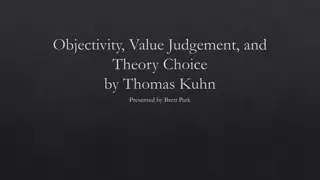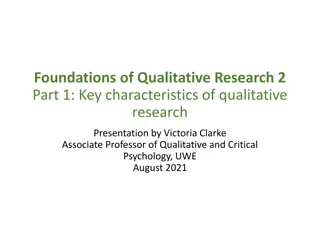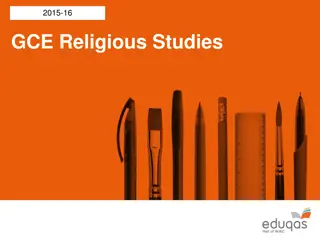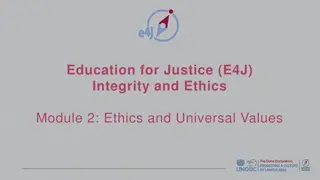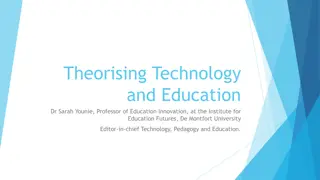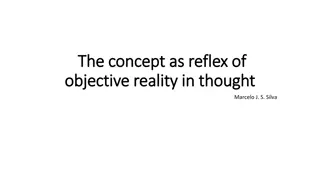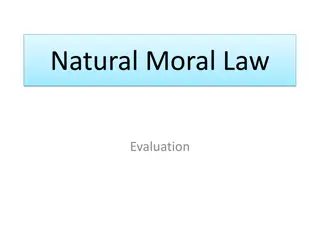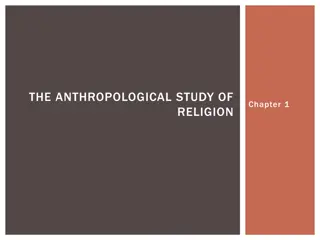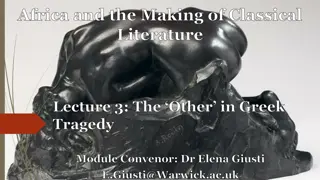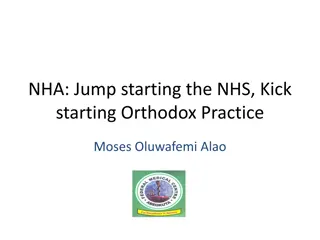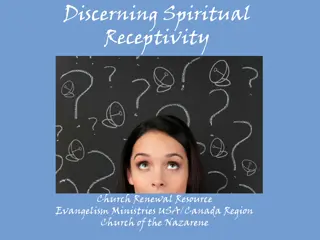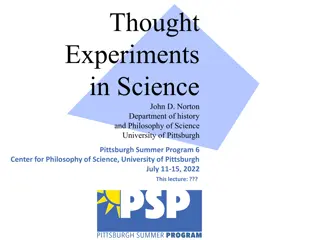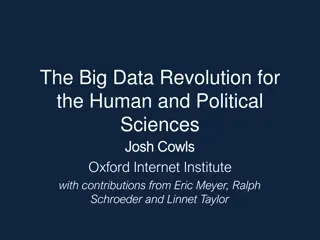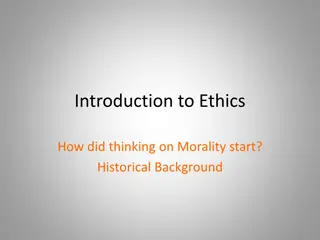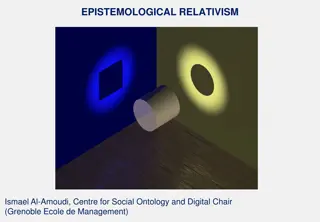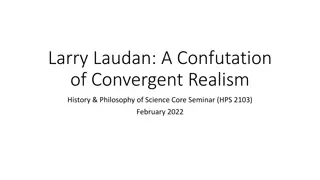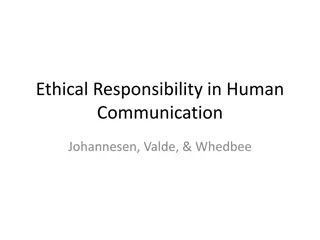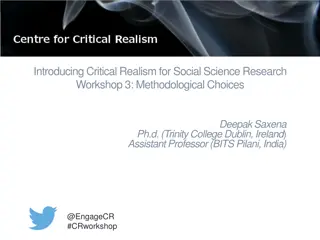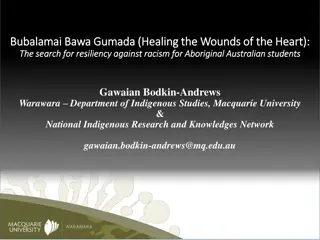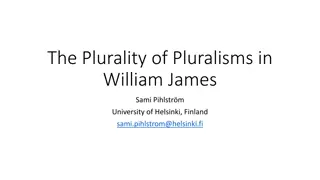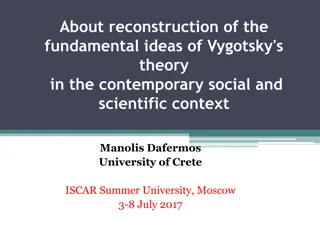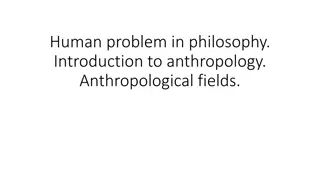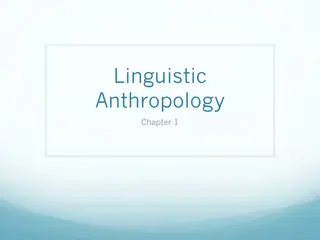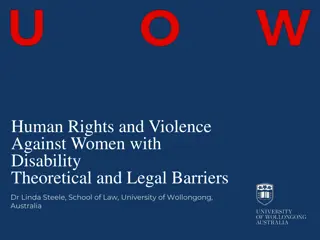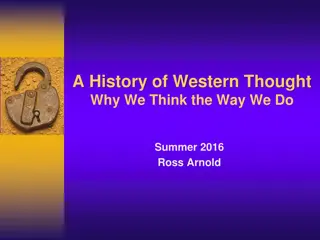Understanding Relativism and its Impact on Critical Thinking
Relativism poses a challenge to critical thinking by asserting that truth is subjective and varies from person to person or society to society. While some forms of relativism, like relativity, can be rational, global relativism faces self-referential inconsistency. Values relativism is commonly appl
0 views • 25 slides
Exploring Ethics: Branches, Theories, and Moral Dilemmas
Ethics delve into Meta Ethics, Normative Ethics, and Applied Ethics to understand moral concepts and decision-making. The discourse covers various ethical theories like Absolutism, Relativism, Subjectivism, and explores the difference between Teleological and Deontological decision-making. Thought-p
5 views • 14 slides
Objectivity, Value Judgement, and Theory Choice in Science
Thomas Kuhn's work explores the subjective elements in theory choice, highlighting that theory selection is not solely based on objective algorithms. He discusses the structure of scientific revolutions, where science shifts between normal and revolutionary phases. Kuhn's ideas have faced criticisms
6 views • 19 slides
Pathways to Community Engagement in Higher Education: A Comprehensive Overview
Exploring the core value of engagement in universities of the 21st century, this content delves into various pathways like institutional, pedagogical, and epistemological that contribute to community interaction and knowledge production.
0 views • 43 slides
Exploring Key Characteristics of Qualitative Research in Psychology
The lecture series delves into the values, characteristics, and theoretical foundations of qualitative research, emphasizing the differences from quantitative methods. It explores experiential and critical qualitative camps, subjectivity, reflexivity, and ontological and epistemological foundations.
4 views • 18 slides
Ethical Studies Course Overview and Activities
Delve into the world of Ethical Studies with this comprehensive course overview. Explore themes like Ethical Language and Thought, Natural Law, Situation Ethics, and more. Engage in activities like Virtue Ethics starters, fortune line graphs, and discussions on moral dilemmas. Dive into the principl
0 views • 17 slides
Understanding Ethics, Values, and Universal Morality
Explore the concepts of ethics, universal values, and morality in a multicultural context through Education for Justice (E4J) Integrity and Ethics Module 2. Delve into topics such as the Universal Declaration on Human Rights, enacting universal values, moral relativism, and more. Gain insights on th
6 views • 14 slides
Analytic Versus Continental Philosophy in the 20th Century: A Comparative Overview
In 20th-century philosophy, the divide between Analytic and Continental schools deepened but has seen recent attempts at reconciliation. Analytic philosophy emphasizes logic, language, and epistemology, requiring technical expertise, while Continental philosophy rejects metaphysical speculation and
0 views • 15 slides
The Role of Theory in Educational Technology: A Deep Dive into Phenomenological Perspectives
Dr. Sarah Younie discusses how theories shape our observations in technology and education, exploring epistemological perspectives and the importance of theory in pedagogic practices. A case study on teachers' integration of technology highlights the significance of theory in understanding phenomena
3 views • 9 slides
Perspectives on Collective Health and the Concept of Health in Brazil
Brazilian Collective Health movement challenges traditional biological understandings of health, influenced by Althusser and Foucault. It advocates for an epistemological critique and a new scientific paradigm. The concept of health is explored as polysemic, emphasizing the need for a broader perspe
0 views • 11 slides
Evaluation of Natural Moral Law: Absolutism, Relativism, and Ethical Considerations
The evaluation of Natural Moral Law explores the contrast between relativism and absolutism, highlighting the advantages and disadvantages of a deontological approach. It discusses how NML provides universal moral truths, clear answers in times of uncertainty, and sets boundaries for ethical behavio
0 views • 22 slides
Anthropological Study of Religion: Exploring Cultural Diversity
This chapter delves into the anthropological study of religion, emphasizing cultural relativism and holism. It explores various branches of anthropology, such as cultural studies and archaeology, and discusses the holistic approach anthropologists take when studying smaller populations to understand
0 views • 34 slides
Exploring the Role of the Other in Greek Tragedy through Literary Texts
This discussion delves into the representation of the 'Other' in Greek Tragedy, focusing on how language, rhetoric, and symbolism shape reality in classical literature. Through works like "Helen" and "Suppliant Women," the exploration of truth versus appearance, the significance of names and actions
0 views • 34 slides
Reflections on Ethical Practices in Healthcare
Delve into thought-provoking reflections on ethical practices in healthcare, exploring the intersection of medicine, philosophy, and morality. Explore the importance of intention versus outcomes, the role of universalism and relativism in moral decision-making, and the concept of developing a goodwi
0 views • 27 slides
Understanding Spiritual Receptivity in Today's Society
Explore the concept of spiritual receptivity in a society dominated by relativism and pluralism. Discover how Christians can effectively engage with individuals of different beliefs, advocating their faith and values to bring about life-changing results.
0 views • 19 slides
The Epistemological Problem of Thought Experiments in Science
Explore the epistemological challenge of how thought experiments lead to new scientific knowledge, illustrated through examples like Maxwell's Demon. Delve into the clash between thermodynamics and molecular kinetic theory, questioning the applicability of our macroscopic experiences at the microsco
0 views • 55 slides
Big Data Revolution in Human and Political Sciences
Exploring the impact of big data on human and political sciences, this research delves into definitions, challenges, and future directions in utilizing large-scale and diverse data sets. With a focus on practical, ethical, and epistemological considerations, the study highlights the opportunities an
0 views • 48 slides
Exploring the Origins and Diverse Perspectives on Morality
Explore the historical foundations of morality, from Plato's Ring of Gyges to Cultural Relativism, questioning the basis of ethical behavior and societal norms over time. Delve into philosophical debates that challenge our understanding of right and wrong, highlighting the complexities of moral reas
0 views • 17 slides
Understanding Epistemological Relativism in Critical Realism
Epistemological relativism, as explored by Ismael Al-Amoudi, emphasizes how our socio-cultural contexts influence our ways of knowing and seeing the world. It goes beyond mere fallibilism, acknowledging the impact of diverse factors on knowledge production. This concept is significant for researcher
0 views • 11 slides
Critique of Convergent Realism by Larry Laudan
Larry Laudan's "A Confutation of Convergent Realism" challenges the notion of epistemic realism by arguing that historical evidence does not fully support it. He discusses Convergent Epistemological Realism (CER) and presents abductive arguments questioning the truth and empirical success of scienti
0 views • 18 slides
Understanding Ethical Responsibility in Human Communication
Ethical responsibility in human communication entails making judgments on rightness, wrongness, virtue, and obligation. It explores the importance of choice, coercion, and the distinction between morals and ethics. The text delves into relativism, ethical ramifications in communication, and the prac
0 views • 9 slides
Understanding the Fertile Ground of Cultural Influences on Religious Movements
Cultures provide fertile soil for diverse religious movements due to various factors such as secularism, existential uncertainties, disillusionment with leaders, and a deep human longing for transcendence. Other contributing factors include breakdown of traditional social structures, moral relativis
0 views • 13 slides
Exploring Critical Realism for Social Science Research: Methodological Perspectives
Delve into the methodological choices and key concepts of Critical Realism for social science research, including the nature of reality, researcher-inquirer relationships, and assumptions about human agency. Learn about the domains of reality in Critical Realism and the distinction between qualitati
0 views • 10 slides
Understanding Racism and Resilience in Aboriginal Australian Students' Education
Explore the complexities of racism and resilience among Aboriginal Australian students through a critical examination of cultural perspectives, epistemological racism, and the manifestations of modern and old-fashioned racism in education settings.
0 views • 35 slides
The Plurality of Pluralisms in William James
William James presents various forms of pluralism in his philosophical works, encompassing metaphysical, epistemological, ethical, metaphilosophical, and religious perspectives. He contrasts pluralism with monism and advocates for a more empirical approach. James's ideas challenge conventional monis
0 views • 12 slides
Reconstructing Vygotsky's Theory in Contemporary Context
The reconstruction of Vygotsky's fundamental ideas in the modern social and scientific landscape is crucial due to misconceptions and challenges faced in international academic communities. This process involves understanding the cultural-historical theory, exploring broader epistemological and meth
0 views • 29 slides
Understanding Human Nature Through Philosophy and Anthropology
Explore the different perspectives on human nature through philosophy and anthropology, from ancient Greek philosophers like Aristotle to modern thinkers like Freud and Sartre. Delve into the intersections of theology, psychology, and cultural relativism in shaping our understanding of what it means
0 views • 12 slides
Understanding Linguistic Anthropology and Anthropology: A Comprehensive Overview
Delve into the realm of linguistic anthropology and anthropology to explore the study of humans, culture, language, biology, artifacts, and more. Discover the four fields of anthropology, the holistic approach, and the importance of cultural relativism while avoiding ethnocentrism. Learn how linguis
0 views • 25 slides
Violence Against Women with Disability: Theoretical and Legal Barriers
Troubling the assumed dis/connections between gender, disability, the human, law, violence, and feminism. Examining epistemological, material, legal, political, and ontological limitations in addressing violence against women with disability. Discusses the prevalence, forms, and implications of viol
0 views • 11 slides
Evolution of Western Philosophical Thought: From Idealism to Humanism
Explore the rich history of Western philosophical thought from the idealism of Plato to the humanism of Whitehead. Trace the progression of thought, including materialism, rationalism, skepticism, and relativism, as key thinkers like Descartes, Kant, Marx, and others shaped our understanding of real
0 views • 16 slides


